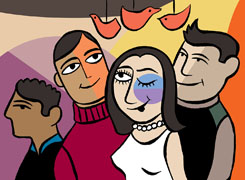Need Expert Advice?Our Gurus Can Help

Kanchan Rai
Relationships Expert, Mind Coach
623 Answers | 149 FollowersFollow
Rai has a degree in leadership development and customer centricity from Harvard Business School, Boston. She is an internationally certified coach from the International Coaching Federation, a global organisation in professional coaching.... more
Answered on Jul 24, 2025

The most important thing now is to move from subtle hints to open-hearted conversation. Not confrontation, not blame. But a real, calm moment where you say something like:
"I’ve been feeling increasingly distant from you—not just physically, but emotionally. I know life has been exhausting and we’re both stretched. But I miss being close to you. I miss feeling wanted, seen, connected. Can we talk about what’s going on between us? Not to pressure or fix it overnight, but just to understand where we are?”
You're not asking for sex. You’re asking for honesty, presence, and partnership. And if your husband is emotionally closed or dismissive, it may help to involve a couple’s therapist—someone neutral who can help unpack any barriers between you two.
This isn’t just about sex. It’s about closeness, and the quiet loneliness that’s creeping in despite being married and sharing a home and child. Don’t keep absorbing that pain in silence. You deserve connection, not confusion. And your marriage deserves a chance to heal, not just survive.
You're not overreacting. You're paying attention—and that’s the first step toward change.
Answered on Jul 24, 2025

So, what can you do? You begin with honesty, not by confessing everything at once, but by taking responsibility gently. You can say something like:
"There’s something very difficult I need to share, because I value the connection we’ve had and the kindness you’ve shown me. When we first started talking, I didn’t expect it to mean so much. I used a different name and didn’t realise who you really were until recently. That discovery shocked me, and I’ve been scared—of your reaction, of mine, of the consequences. But I also feel immense guilt, because the connection was real for me. You’ve been someone I admire deeply, and I didn’t want to disrespect or mislead you."
This is not about asking him to forgive you or continue anything. This is about closing the gap between who you were and who you are now—with courage, clarity, and care.
He may feel betrayed. He may take time to process it. He may even need space. But you will have done the right thing by coming clean. And regardless of what happens next—whether the connection continues or not—you will walk away knowing that you chose truth over fear.
Also, give yourself grace. You’re human. We all make decisions that seem easier in the moment but become difficult to carry later. What matters now is how you handle the truth—not just for him, but for your own growth and peace.
Answered on Jul 24, 2025

Rather than trying to “fix” your personality or “force” your discipline, start by restoring trust in yourself. Trust doesn’t come from perfection; it comes from showing up consistently for yourself in small, simple ways without pressure to perform. Your fear of failure and even your fear of success are both rooted in the same place: the doubt that you are enough as you are.
It’s okay to slow down. It’s okay to not have all the answers. The goal isn’t to become a different person—it’s to become more at peace with the person you are becoming. Self-leadership starts here: by choosing compassion over criticism, patience over pressure, and honesty over performance. Even if your steps are small and scattered, they are steps forward.
You don’t need external urgency to change. You need internal safety to try. So let’s shift the story you’re telling yourself. You’re not behind. You’re not broken. You are learning, growing, and unlearning decades of conditioning—and that’s not only brave, it’s transformative.
Keep going. Gently, but steadily. And every time you fall back into old patterns, remind yourself: coming back is progress too. The journey to emotional strength is not about never falling—it’s about returning to yourself, again and again, with love.
Answered on Jul 16, 2025

Now, the focus shifts to you — your healing, your emotions, and your ability to hold on to what was meaningful while also protecting your own peace. Start by accepting that it's okay to feel sad, even tearful. Allow yourself to miss him, but don’t let that feeling convince you that you’re incomplete without him around. You’re not losing everything — you’re transitioning from closeness to distance, which may or may not evolve into a deeper connection, depending on both of you.
Use this phase as a mirror — reflect on what you truly want: was this just emotional comfort in a shared space, or did you genuinely want a future with him? If it’s the latter, and he didn’t show similar feelings, it’s okay to grieve that quietly while slowly detaching.
Let this moment teach you not about loss, but about how deeply you can feel, and how resilient you are in giving space to someone while still holding space for yourself. Nurture your friendships, invest in small routines that uplift you, and remind yourself that care and affection will come again — sometimes from unexpected people and places.
If you feel you need closure or more clarity from him, it’s okay to have one final honest conversation. Just remember, your peace matters more than anyone’s presence.
Answered on Jul 16, 2025

It’s also thoughtful to ask about the values that have shaped her while growing up, which opens a space for connection rather than judgment. Asking how she sees her role in a family — not just as a wife but also as a daughter-in-law — can lead to an honest discussion about expectations and boundaries in a shared home, if that’s the arrangement.
Instead of assuming, it’s better for the mother to gently inquire about how the girl handles tough situations or disagreements. This shows her emotional maturity and communication style. The tone should be conversational, not interrogative — the idea is to build comfort, not pressure. Ultimately, these questions should be guided by curiosity, empathy, and the genuine intention to understand whether the girl and the boy can build a respectful and fulfilling partnership together.
Answered on Jul 14, 2025

You’re not wrong to feel stressed. You’re not overreacting. You’re simply reacting to a system that constantly undermines your independence. And now, with love and marriage in the picture, the pressure increases — not just because you want to choose your partner, but because you know the emotional cost your mother might pay if your father feels challenged again.
Here’s the hard truth: living your life to protect someone else’s comfort or to avoid conflict is not truly living. Yes, you love your mother, and yes, your father’s patterns may continue — but your life cannot be paused or dictated by his inability to manage his own emotions. You are not responsible for his temper or his ego. You are responsible for your own peace.
This doesn’t mean rebellion — it means building quiet strength. If this relationship is truly what you want, start gently setting emotional and logistical boundaries. You can continue to present him as a “friend” for now while you plan your next step. You may need support — from a mentor, therapist, or trusted elder — to navigate this transition calmly and safely.
What’s most important is that you do not let fear become your compass. Your parents’ insecurities are not your burden to carry forever. Your life, your relationship, your happiness — they are yours to own. And if you ever feel overwhelmed, remind yourself of everything you've overcome already. You walked away from a premier institute and built something solid for yourself. That kind of strength doesn’t go away — it just needs permission to rise again.
Answered on Jul 14, 2025

The fact that this relationship has been secret for three years also speaks volumes. Silence can often feel safe in the short term, but it becomes heavy in the long run. If marriage is truly on the table, shouldn’t visibility and openness be part of the foundation?
You’re asking, “Why can’t a woman have both?” And the answer is — she absolutely can. But she needs to be with someone who wants her to shine, not someone who only sees her as a companion if she dims her own light. Real love doesn’t demand abandonment of purpose. It makes space for it. It supports it. It celebrates it.
This is the time to pause and ask yourself: What kind of life partner do I truly need? One who walks beside me, or one who expects me to follow quietly? And if your inner voice is full of confusion, know that this is normal. You are not selfish for valuing your career. You are not unloving for needing stability and self-respect.
Your next steps should come from a place of alignment — with who you are now, and who you want to become. If you’d like, I can help you reflect deeper through journaling prompts, or structure a conversation with him that allows you to express your truth clearly and without fear.
You deserve a love that expands you, not a love that asks you to shrink.
Answered on Jul 01, 2025

Help her see that relationships built on secrecy and divided loyalties often end in pain, not peace. Let her know she deserves a relationship where she can be fully seen, respected, and acknowledged — not one where she must wait in the shadows while someone else remains the priority. Remind her that no matter what the man says, unless he has taken real, ethical steps to end his existing marriage — not just words — she is being asked to accept less than she deserves.
You don’t need to force her out of it — that may push her away. But you can keep showing her the truth gently, reminding her of her worth, and encouraging her to envision a healthier future. If she’s emotionally attached and unable to break free, suggest she speak to a counselor or therapist to process her feelings with clarity.
Affairs rarely end with peace for anyone — not the person having it, not the one being betrayed, and certainly not the children involved. The longer it continues, the more damage it quietly causes, especially to your sister’s sense of self.
Answered on Jul 01, 2025
Answered on Jun 22, 2025

The truth is, this is no longer just about whether you work or not. It’s about feeling disrespected, dismissed, and unheard. You’ve tried to care — asking him what he’d like to eat, trying to avoid conflict, even putting aside your comfort to please him. And yet, he continues to find fault. That is not a reflection of your failure, but rather of his emotional disconnect and unwillingness to meet you halfway.
Right now, what you need most is clarity. If he insists on you working, the caregiving arrangement has to be revisited — he can’t expect you to work outside and carry all the home responsibilities without support. And more than that, he needs to recognize that partnership means sharing respect, not just finances. You can try to have a calm conversation where you tell him honestly how you’re feeling — not to blame, but to express how deeply this is affecting your emotional health and your ability to feel safe and valued in your own home.
If he’s not open to listening, you may need to consider involving a neutral third party like a family counselor. You do not have to fight this battle alone, nor should you carry the entire burden of the relationship.
You deserve more than just being tolerated — you deserve care, respect, and peace.
Answered on Jun 22, 2025

You’re feeling pain and longing, and that’s human. But trying to convince her to stay by suggesting physical intimacy — especially when you yourself feel it’s not right — will only deepen the emotional conflict and guilt for both of you. Love doesn’t hold someone back just so we don’t feel the pain of their absence. True love honors freedom, even when it hurts.
Right now, the kindest thing you can do — for yourself and for her — is to accept that the relationship has reached a natural closure, however painful it may be. It’s not failure. It’s a sign that both of you must now return to your own paths.
If the emotional stress is unbearable — your sleep is affected, your thoughts are heavy — you may truly benefit from talking to a therapist or emotional wellness coach. Not because you’re weak, but because you deserve to heal in a healthy way.
You don't need to erase the love or the memories. But you do need to release the idea that you must hold on to her to keep yourself from breaking. You are capable of moving through this with dignity, and you deserve peace.
Answered on Jun 22, 2025

Since you are specific about the community and the absence of children from a previous marriage, you may need to be strategic but open in where you look. Along with trusted matrimonial platforms (you may try both community-based ones and modern curated matchmaking services), also let friends or extended family you trust know that you’re open to exploring proposals — sometimes word-of-mouth alliances bring surprisingly good connections.
While choosing, don’t just assess background or profession — give time to observe his emotional depth, communication style, respect for your past, and how he responds to small differences or stress. These are the real foundations for peace and partnership.
Also, give yourself permission to set boundaries without guilt. You are not obligated to compromise your standards just because it’s a second marriage or because of age. You deserve companionship, not adjustment.
And perhaps most importantly, don’t let societal timelines cloud your confidence. You are 39, not late — just clearer than before. Be honest, hopeful, and patient with yourself.
Answered on Jun 22, 2025

It’s absolutely fair for you to ask where things are headed. Waiting endlessly without a timeline or real effort can lead to quiet heartbreak. You don’t have to demand a marriage proposal, but you do deserve honesty — is he planning to talk to his parents? When? What’s his plan if they disapprove?
You are not too young to feel disturbed — love always stirs the heart, at any age. But you’re wise to ask whether this situation is serving your peace of mind. And here's the truth: if you have to keep silencing your needs to keep the relationship going, it will slowly empty you.
Have one clear, calm conversation with him. Let him know you’re not pushing for guarantees, but you need to know whether he's willing to try — and not just "someday." If he avoids, delays, or sidesteps again, it’s okay to take a step back. You’re not punishing him — you're protecting your future self.
And if part of you already knows he may never be ready, it’s okay to move forward. You’re 20, with a long, vibrant life ahead. Don’t let fear of loss keep you from choosing peace.
Answered on Jun 22, 2025

Rather than asking for permission or sneaking around the discomfort, try being open and respectful in your communication. You could say something like: “My mom is alone for a few days while dad is out of town, and she’s not comfortable being alone — so I’d like to stay with her just to support her emotionally. I’ve been here continuously and want to return soon after this short visit.”
When your in-laws see that you are considerate and not abandoning your responsibilities, but simply being a good daughter too, they’re more likely to understand. Over time, your consistency and maturity will build trust.
It’s also okay to gently help your in-laws understand that both families are important to you — and your presence in each doesn’t threaten your role in the other.
Answered on Jun 22, 2025

Answered on Jun 14, 2025

Sabse pehle, aapko yeh samajhna hoga ki aap ki problem real hai, serious hai, lekin treatable hai. Aap weak nahi hain. Aap ek aisi psychological condition ka samna kar rahi hain jiska proper treatment possible hai — aur aapne sabse pehla aur bahadur kadam le liya hai: apni feelings ko articulate karna.
Aapko iss waqt ek clinical psychologist ya psychiatrist se consult karna chahiye. Psychiatrist agar zarurat samjhe to mild medication bhi de sakte hain jo aapke nervous system ko calm karne mein help karega. Psychologist ke through aapko CBT (Cognitive Behavioral Therapy) jaise tools milenge jo aapko apni anxiety ko samajhne, manage karne aur dheere-dheere control mein laane mein help karenge.
aap mere social media me phi query dal sakte hai
Answered on Jun 14, 2025

Answered on Jun 10, 2025

When someone subtly undermines you — especially in a professional setting — it can chip away at your confidence and presence in ways that aren’t always easy to name. Your instinct to avoid reacting impulsively or retaliating is wise, but choosing not to react does not mean you must tolerate disrespect or power play.
This dynamic is less about the junior’s credentials and more about a breach of professional decorum. Subtle challenges in meetings, tone policing, or backhanded comments are often masked as confidence or "fresh ideas,” but if the intent or impact is to sideline you or question your authority publicly, it needs addressing — calmly, firmly, and early.
Here’s a way forward. First, document patterns — what’s said, when, in whose presence, and how it impacts the team dynamic. This is not for confrontation, but for clarity and grounding your experience.
Then, create a direct but non-confrontational one-on-one moment. Frame it from a place of collaboration, not accusation. For example, “I’ve noticed a few instances where we seem misaligned in team meetings — I’d like to understand your point of view, and also share how that’s being perceived in the room.” That opens a door rather than slamming one.
At the same time, reinforce your presence in the room — not by competing, but by anchoring in your experience, clarity, and calm authority. Redirect when needed. If the junior interjects or oversteps, acknowledge briefly, and then say, “Let’s circle back to that once I finish.” It’s subtle, professional boundary-setting.
You don’t need to prove your worth — you’ve earned your seat. But you do have the right to protect your space, and even more so, your peace.
Answered on Jun 10, 2025

The fact that your fiancé focuses primarily on physical intimacy while you’re still seeking emotional grounding raises a significant concern. It’s not about being shy or conservative — it’s about emotional safety and trust, which are foundational. If you're already feeling a disconnect or pressure now, it’s unlikely things will magically fall into place after marriage.
You’re not obligated to silence your discomfort for the sake of avoiding conflict. Start by being honest with yourself: Is this the kind of connection you want for life? If the answer is uncertain, it’s better to pause than to proceed out of pressure.
You don’t have to go straight to your family or his with everything. Start by writing down how you feel and what you’re afraid of. Then, speak to someone you trust — maybe a sibling, cousin, or a therapist — someone who can help you reflect calmly. If you feel strong enough, you can then have a direct and respectful conversation with your fiancé. Ask him what he expects in this relationship beyond the physical, and express clearly that you’re looking for a deeper bond, not just intimacy.
A marriage can be postponed or even reconsidered, but a life spent in silent emotional disconnect can weigh you down. You are not being unreasonable — you’re being honest and self-aware. That’s the best foundation for any life decision.
Answered on Jun 10, 2025

The only responsible way to move forward is to encourage them to seek professional help — through marriage counselling, family therapy, or at least structured mediation. If after that, they still can't communicate or co-parent peacefully, then separation may be the healthiest path, not just for them, but for the kids and for you.
You, on the other hand, need to draw a boundary. Listening doesn’t mean absorbing. Supporting doesn’t mean sacrificing your own well-being. You’re already managing aging parents, your own legal career, and life’s pressures — this is too much to bear alone. Let your brother know lovingly that you care, but he needs to begin taking decisive steps toward either mending or ending this — and get professional input.
Answered on Jun 10, 2025

But let’s take a breath and think clearly. At this stage, don’t chase, don’t plead. Pause. Sometimes when children get a sudden rise in success or independence, they feel overwhelmed and confused — not necessarily cruel, but emotionally distant and unprepared to carry responsibility. Give him some space, but keep your dignity. Let him understand that while you’re proud of him, you are also deeply hurt — not because you need his money, but because you expected respect and gratitude.
Try writing him a heartfelt message, calmly, without blame. Share your disappointment, but also the truth: that you stood by him without hesitation, and what you expected wasn’t repayment — but a bond that didn’t break with success.
At the same time, you must protect your own peace now. Don’t let your health and well-being fall apart over this. Start having a serious financial plan for your future — with or without his help.
You have done your duty. Now, let’s make sure you don’t lose yourself in someone else’s silence.
Answered on Jun 02, 2025

On the other side, your parents are not being unreasonable. They’re asking for basic accountability — that he take responsibility, that they get to know who he is and what kind of family he comes from. They're not making you choose a religion or forcing you into someone else's marriage — they're asking for respect and clarity, which is valid, especially after what happened. They're also trying to protect you because they saw him react in an unstable way once already.
Now you’re left holding all the emotional weight, trying to build a bridge between two sides that aren’t willing to meet halfway.
Here’s the truth: you cannot hold a relationship alone. If he wants you, truly wants to marry you, he should show the maturity and courage to meet your parents, take ownership of his mistake, and explain his family's intentions. If he's too afraid or unwilling to do even that, then you have your answer.
You don't need to make a decision right now. But do ask yourself: Is this the kind of support and courage you want in a life partner? Not just someone who says they love you, but someone who will stand for you when things get hard. So far, it seems like you’ve done all the standing.
Answered on Jun 02, 2025

At the same time, if threats are being made — especially involving harm or illegal actions — this is a legal matter. Document all such threats (texts, calls, witnesses), and if you feel unsafe, don't hesitate to consult a lawyer and, if needed, file a police complaint. Emotional abuse and threats to life or marriage are not just morally wrong — they can be legally challenged.
If your husband is stuck in guilt or fear, you both may benefit from professional marriage counseling or intervention from a neutral mediator, someone his family might respect. If that’s not possible, he will need to decide if he wants to live under control or live with integrity — as a husband committed to building a future with you.
You, on your part, need to stay mentally strong. Don’t isolate yourself. Speak to a trusted friend, counselor, or women’s support group. You’ve shown courage by standing for love — now you need that courage to protect your dignity and claim your rightful space in the relationship.
Answered on Jun 02, 2025
Answered on May 23, 2025

Shaadi sirf physical connection nahi hoti — woh ek emotional, mental aur spiritual partnership bhi hoti hai. Agar abhi, engagement ke dauraan hi aapko yeh lag raha hai ki uska vyavhaar superficial hai, aur wo sirf physical cheezon mein interested hai, toh ye sochne ki zarurat hai ki aage jaake aap aur zyada emotionally alone feel karengi.
Aapne pehle November tak rukne ki baat ki thi, aur usme kuch galat nahi tha — aap sirf samajhna chahti thi ki kya yeh insaan aapke liye theek hai ya nahi. Aapki family ne jaldi decide kar liya, lekin abhi bhi aapke paas choice hai. Shaadi ke baad agar aap khush nahi hoti hain, toh us dard aur regret ka bojh aapko hi uthana hoga — na ki un logon ko jo aap par pressure daal rahe hain.
Aap chahein toh kisi trusted friend ya family member se baat karein jinke saamne aap khul ke apne doubts rakh sakti hain. Agar kisi se baat karna mushkil hai, toh aap kisi therapist ya counselor se confidentially baat karke apne emotions ko clear kar sakti hain.
Sabse zaruri baat yeh hai: aapko koi aisi shaadi nahi karni chahiye jismein aap respected, secure aur emotionally valued feel na karein. Agar abhi se aapko lag raha hai ki yeh rishta sirf ek taraf se hi chala jaa raha hai, toh yeh time hai sochne ka — kyunki baad mein sab kuch aur complicated ho sakta hai.
Aapka sukoon aur self-respect kisi bhi rishton se upar hai. Shaadi tabhi honi chahiye jab aap dil se “haan” keh sakein — sirf logon ke kehne se nahi.
Answered on May 23, 2025

Ignoring him, on the other hand, might feel unsatisfying in the short term but often proves to be the most mature and self-protective path in the long run. Some people thrive on reaction. When they don’t get one, they eventually stop trying.
The deeper work here is about your family’s emotional boundaries. Keep your focus on your husband, your daughter, and your home’s peace. Don’t let someone else’s unresolved emotions hijack your daily life. If this man isn't actively threatening or interfering anymore, let silence and indifference be your strength. Let your husband know that you trust his judgment but also encourage him to respond from a place of calm—not pride or anger.
Sometimes, the most powerful message you can send to people like this is that they no longer hold any space in your mind, heart, or life. Peace is more powerful than confrontation.
Answered on May 23, 2025

Have both of you truly processed the emotional weight of what that would mean—not just for yourselves, but for the two children who know her as their mother and you as their father, even if they are aware of none of this complex history? Would a shift from this protective illusion to a real romantic relationship feel emotionally clean—or does it risk carrying guilt, confusion, or emotional baggage for either of you?
The question isn’t just whether “no one will know”—it’s whether you both will be emotionally at peace with this decision for the rest of your lives. Love, affection, companionship—these are valid and beautiful needs at your age. You deserve them. But they must come without a shadow of unresolved complexity or psychological discomfort, especially when children are involved.
You also need to think carefully about legality. Though this woman is not your biological wife, official records reflect her as such. If you move forward as a real couple, you’re essentially formalizing a previously informal truth—but you’re also deepening a secret. Is that a foundation you feel secure building a life on?
Here’s a suggestion: take a pause. Sit down with her—openly, with honesty—and explore whether this desire is rooted in genuine romantic connection, or whether it’s stemming from a shared loneliness and long companionship. The difference is critical.
You are both allowed to seek love and connection. But you must do it in a way that honors truth, emotional clarity, and long-term peace. If you sense even the slightest doubt or emotional confusion from either of you, it might be better to redefine your relationship in a healthier, more truthful way—not necessarily romantic, but meaningful, supportive, and free of secrets.
You’ve already sacrificed enough of your personal life for others. Now is the time to choose a future that is deeply your own—and built on honesty, not just convenience or secrecy.
Answered on May 23, 2025

You don’t need to rush into decisions, but you do need to step into a position of emotional self-respect. You have the right to seek peace, meaning, and mutual respect in a marriage—and if that space no longer exists in your current home, then you are justified in seeking a new one. Sometimes, the courage to choose your own sanity is the first real step forward.
Whether that means separation, legal counseling, or even mediated family intervention, it’s time to act—not just wait. You’ve already been told where they stand. The question now is: where do you stand, and what are you willing to accept for the rest of your life?
The answer may not be easy, but it will be yours—and that is the beginning of reclaiming your strength and direction.
Answered on May 23, 2025

If moving out again isn't possible immediately, then set some boundaries inside the home. Claim time and space that are yours, especially when you're working. Re-establish your right to speak your language, to teach your child your culture. It’s not just your right—it’s his heritage.
You are not wrong to want peace, and you're not selfish for needing help. You’re a daughter, a mother, a wife—and you're also a woman who deserves compassion, support, and room to live without apology. Please don’t carry this silently any longer. If not with friends or family, consider talking to a counselor online. You’ve carried too much on your own already. It’s time to ask for space, for support—and for healing.
Answered on May 23, 2025

Waiting for someone who says they cannot take action means putting your life—and your ability to find happiness and stability—on hold. Ask yourself: what are you truly waiting for? Hope? A promise he might never fulfill? Or are you waiting because the pain of letting go feels greater than the pain of staying in uncertainty?
You deserve to be with someone who chooses you fully, without delay or hesitation. Someone who can build a life with you, not just speak about a love that lives in a future that never arrives. The hardest thing to do in love is to walk away from someone we deeply care for—but sometimes that is the very act of self-respect and self-love we need to grow and truly heal.
You are not wrong for loving him. But ask yourself now—do you want to keep loving someone who has told you he cannot be yours? Or do you want to start the difficult but empowering journey of making space for someone who truly can?
The answer lies not in waiting for him to change, but in deciding what you deserve—and then standing by it.
Answered on May 23, 2025

At the same time, it’s worth acknowledging that this transition hasn’t been easy for your in-laws either. Their son married for the first time later in life and brought into their household a ready-made family. For people who may hold traditional views, this shift might be difficult to process—not out of malice, but out of fear, confusion, or even grief for the expectations they had. That doesn’t excuse hurtful comments, but it may explain the resistance. Sometimes, criticism is a mask for fear of change or loss of control.
Still, your husband plays a crucial role in this dynamic. You're not asking him to reject his parents—you’re asking him to support the family he has chosen to build with you. That means advocating for respect, clarifying boundaries, and ensuring that his home is a place where all members, especially children, feel emotionally safe.
Approach him with openness and care. Share how this environment is impacting you and your children—not in anger, but in vulnerability. Help him see that you're not looking to blame anyone, but to bring everyone into alignment with a shared vision of family—one that includes kindness, respect, and patience on all sides.
Answered on May 23, 2025
Answered on May 20, 2025

This is a time to reassess, not retreat. You can explore consulting, advisory roles, or leadership positions in businesses that need your experience. You may also need support—through coaching or mentorship—to rebuild clarity and confidence.
Don’t let societal pressure decide your next step. Focus on what’s practical, meaningful, and aligned with your stage in life. You’re not starting over—you’re realigning. With clear planning, you can create a strong second chapter.
Answered on May 07, 2025

Once you've had a few of these short, easy interactions, you can slowly open up the conversation to more casual topics—like college life, favorite subjects, or even the stress of deadlines. This way, you’re not jumping straight into anything personal, but you're gradually building a sense of comfort.
Don’t try to impress her. Just be sincere, kind, and a good listener. Most people, even those who seem quiet or reserved, appreciate being approached respectfully and gently. And remember, confidence doesn’t mean being loud or charming—it means being real and respectful even when you’re nervous.
If you stay patient and consistent, she might start to feel more comfortable around you. And even if it doesn’t turn into something romantic, you’ll grow socially and emotionally—which will help you a lot in the long run.
Answered on May 07, 2025

You’ve evolved over the years—mentally, emotionally, and in lifestyle—and it sounds like your wife hasn’t moved in that same rhythm. That mismatch in growth and energy is now affecting everything: your respect for her, your shared routines, your sex life, and ultimately your mood and emotional well-being. It’s painful to feel like you're constantly giving—time, energy, effort—and not receiving the same in return. Even when your partner is kind, if they aren’t meeting you emotionally, intellectually, or intimately, over time it creates a sense of loneliness within the relationship, which can be worse than being alone.
But here's something to reflect on: for 21 years, you stayed, gave, adjusted. Not just out of duty, but because something about her and the family life you built mattered. That still counts. What you’re going through doesn’t mean the marriage has failed—it means the marriage needs re-evaluation and rebalancing. You are not selfish for wanting more stimulation, connection, or passion. You're human.
You have two broad options: one is to initiate a real, vulnerable, uncomfortable conversation with her—without blame, without emotional outbursts, but with absolute honesty. You could say something like: “I’ve grown a lot in these past years, but I’m starting to feel increasingly alone in this relationship. I need more emotional connection, more engagement—not just physically, but intellectually, as partners. I don’t want to silently drift further away. I’d like us to work on this, but it has to be a two-way effort.”
If she's open to it, couples therapy could be a powerful space for both of you to express what you feel without it turning into a war of criticism and defense. Sometimes people, especially those who’ve become emotionally stagnant, need structured help to realize what their partner has been carrying silently.
The other option—if you feel she’s unwilling or unable to grow or change—is to consider what a life apart might look like. That’s a deeply personal and difficult decision, especially with nearly adult children, but you deserve a relationship that brings life into you, not drains it out. If you keep compromising your emotional needs, resentment will only grow and harden into permanent distance.
Before making any move, take a little time to reconnect with yourself. What do you want—not just from her, but from life, from love, from this next phase of your journey?
Answered on May 07, 2025

You have already proven your strength by completing a year of M.Tech in such tough conditions. That says a lot about your resilience and capability. If you give it up now, not only will you lose that part of yourself, but it may not guarantee that your marriage improves. Often in emotionally imbalanced relationships, one-sided sacrifices don’t lead to healing—they lead to more control, more blame, and more emotional exhaustion.
Your husband needs to understand that love isn’t proven by giving things up. Love is shown in support, presence, patience, and respect. If he isn’t willing to stand by you during a temporary phase of physical distance while you pursue something valuable, then you’re not the one breaking the marriage—he is.
It’s also clear that he has grown up in a home where abuse was normalized, and that emotional damage might be affecting how he treats you now. That is not your fault, and it is not your job to tolerate mistreatment in the name of saving a marriage.
Your mother is right to encourage you to finish your M.Tech—not just for your career, but for your self-worth. You deserve to be with someone who lifts you up, not someone who pulls you down every time you try to grow.
If there's still a chance to salvage this relationship, it has to start with real conversations—honest, respectful, and possibly with the help of a counselor or neutral third party. But that only works if both people are willing to put in the emotional effort.
Right now, I suggest you protect your mental and emotional well-being. Prioritize your studies, build emotional support from friends or family who truly care about you, and give yourself space to heal from this emotional chaos. If your husband truly wants this marriage, he needs to come forward with maturity and respect—not demands.
Answered on May 07, 2025

Right now, your focus should be on protecting your peace and your relationship. Keep communication open with your husband and support each other through this, because this kind of external stress can silently damage trust if not handled carefully. The more united you two are, the less space there is for anyone else to create confusion between you.
It’s unclear exactly what this man wants, but based on his pattern, it seems he either wants attention, control, or to destabilize your marriage out of resentment or personal failure. Either way, you don’t need to carry his emotional mess. If you continue to stay calm, ignore him, and document anything serious, you'll be in a stronger position to protect yourselves.
Answered on May 03, 2025

Her not objecting to physical touch doesn’t automatically mean consent or emotional interest—she may feel unable to speak freely because of her job. Before taking things further, have an honest, respectful conversation. Ask her how she feels, without pressure, and make it clear her job is secure no matter what.
If feelings are mutual and genuine, and you're both ready to face potential family complications, you can move forward carefully. But emotional clarity and mutual respect must come first.
Answered on Apr 17, 2025

Now that you're feeling ready for a serious relationship, here are a few steps you can take to approach this new chapter with confidence and self-awareness.
Start with clarity. Reflect on what kind of partner you're looking for—not just in terms of age or background, but emotionally and mentally. What values matter to you? What kind of connection are you seeking? Are you open to someone who has been married before? Children? When you’re clear, it becomes easier to recognize the right person when they appear.
At the same time, look inward. Do some emotional housekeeping. Ask yourself: What kind of partner do I want to be? Am I emotionally available? Am I still carrying regret, fear, or pressure about being “late” to marriage? Because entering a relationship out of guilt or urgency often leads to settling. But entering it from a place of self-respect and genuine desire creates something meaningful.
Since you're actively searching, it’s okay to use all tools at your disposal—matrimonial sites, family networks, friends, or even a good matchmaker if culturally appropriate. But be patient and realistic. Finding someone who is also ready, aligned with your values, and emotionally compatible can take time.
Also, try not to let pressure—internal or external—rush you. You don’t need a "perfect" partner; you need someone who sees you, respects you, and is willing to grow with you.
And here’s something to hold on to: many people find love in their 40s, 50s, even later—and those relationships are often more conscious, mature, and fulfilling, because they’re built on real-life experience and emotional wisdom, not just youthful impulse.
Answered on Apr 17, 2025

Let’s take a step back. It sounds like your parents operate from a space of fear, control, or perhaps even cultural conditioning—believing they know what’s “best” for you, even when that means disregarding your emotions. But here’s the truth: you are the one who has to live with the choices made in your life. Not them. You’re not doing something wrong by loving someone. You’re not “disobedient” because you want a say in your own future.
That being said, when you’ve grown up in a strict household, especially where obedience is confused with love, it can be incredibly hard to assert your independence without feeling crushing guilt or fear. But you need to ask yourself: What kind of life will I have if I continue to silence my heart to please others?
This doesn’t mean you need to make a drastic decision right away. But you do need to begin slowly reclaiming your emotional power. Start by asking: do I want to live in a way that makes others comfortable but leaves me emotionally unfulfilled? Or do I want to begin building the courage to live life on my own terms, even if it means disappointing people?
Your education is important, yes—but love and education are not mutually exclusive. Healthy relationships can actually support your growth, help you manage stress, and increase your emotional resilience. If your boyfriend is kind, supportive, and genuinely wants to see you thrive, that’s a blessing, not a burden.
One path you might consider is gradually building emotional boundaries with your parents—not out of rebellion, but from a place of self-respect. That might look like choosing not to share every personal detail with them, or gently but firmly asserting that your relationship is your private choice. It might mean seeking financial or emotional independence so that your choices aren't controlled by fear of what they’ll do or say.
It won’t be easy—but here’s the truth: choosing yourself doesn’t mean you don’t love your parents. It means you also love yourself.
Answered on Apr 17, 2025

Children are incredibly perceptive. They learn what love looks like not just by how they are treated, but by observing how love is modeled around them. Growing up in a house where emotional distance is the norm can quietly shape their beliefs about relationships. On the flip side, seeing you pursue emotional fulfillment and healthy love can show him that joy, mutual respect, and connection matter—and that it’s okay to change paths when something isn’t working.
Before making any life-altering decisions, it’s crucial to explore your options with clarity. Counseling can be immensely helpful—not necessarily couples counseling, but individual therapy to work through the emotional layers of guilt, confusion, and pressure. It can also prepare you emotionally if you decide to move forward with ending your marriage.
It’s also essential to understand the potential legal, familial, and cultural implications if you choose separation or divorce. Seek guidance not just from an emotional well-being perspective, but also from a legal standpoint. Surround yourself with people who support your healing and growth, whether that’s friends, a therapist, or a coach.
Ultimately, you deserve a life where you feel seen, valued, and emotionally safe. You deserve to model happiness, not sacrifice, for your child. And you deserve to make choices not out of fear, but out of love—for yourself, and for the life you wish to create.
Answered on Apr 14, 2025

Ask them what they feel in those moments—do they need space to think? Do they feel overwhelmed? Are they afraid things will escalate? Try to genuinely understand their side too.
Together, you can come up with a “pause plan”—a middle ground. Maybe your partner can say something like, “I need an hour to clear my head, but I promise we’ll talk after that.” That way, you get the reassurance that the issue won’t be ignored forever, and they get the breathing room they need.
Also, remind yourselves that you’re on the same team. The goal isn’t to win the argument—it’s to understand each other better and reconnect.
You’re not the only one trying—it just feels that way because your emotional needs are different. With communication, empathy, and small agreements about how to handle conflict, this doesn’t have to stay a painful pattern. You're already doing the brave thing by reflecting and wanting to improve this—see if you can invite your partner into that same space of honesty and growth.
Answered on Apr 14, 2025

Your dad's resistance is clearly rooted in fear—fear of what society will say, fear of repeating a past that felt traumatic for him during your brother's marriage. His concern isn't necessarily about your partner’s character, but about how it looks to others. Unfortunately, a lot of our parents were raised to give more weight to "what people will say" than to personal happiness. It’s not your fault he carries that burden. You’re just trying to live a life that’s true to your heart.
Your boyfriend seems like someone who really cares about you and is ready to wait for you through all this. That's rare, and it matters. If his family was kind enough to approach yours respectfully, it shows they are willing to build a bridge. You’re not trying to force anything—you’re asking for space to make a decision with both head and heart involved.
As for appearance and caste: no, these should not be what define a life partner. A dark complexion or a different community cannot and should not outweigh honesty, kindness, emotional maturity, and shared values. Looks fade. Status changes. But someone’s nature stays. And in a marriage, when times are tough, it’s not the family’s last name or the shade of their skin that matters—it’s whether they stand by you or not.
You mentioned something powerful: that you believe this was “meant to happen.” And I agree—sometimes people enter our lives with a timing and connection that doesn’t make logical sense but feels profoundly right. That’s not something to toss aside easily.
Now, about convincing your father—it’s hard to change someone who is set in their ways, but here’s what you can try:
Let your mother be the mediator since she’s more open. Ask her to have slow, non-threatening conversations with him—not to pressure him, but just to help him understand that you are not making a hasty or rebellious choice. You’re thinking practically and from the heart. It’s not about rejecting their values but about choosing someone you can build a peaceful, respectful life with.
You could also write a heartfelt letter to your dad—sometimes, parents understand better when there’s no direct confrontation. Share your side, your fears, your respect for him, and your reasons for choosing this person. Let him know you still want to be his daughter, that you haven’t forgotten your family’s worth—you’re just hoping your happiness can also be valued.
Most importantly—give yourself credit for how well you’ve handled this. You’ve shown maturity, patience, and self-awareness. Even when it hurts, you’re not reacting with drama or impulse—you’re processing, reflecting, and trying to do the right thing.
And please don’t let anyone make you feel like your love is a mistake. You’ve loved with honesty and stood strong—no matter what comes next, that’s something to be proud of, one step at a time.
Answered on Apr 14, 2025
Answered on Apr 14, 2025

But here’s a gentle truth: you are not unwanted. You are not unworthy of love or care. The way others treat you does not define your worth. Sometimes, unfortunately, people—even family—fail to show up for us in the ways we need. That doesn’t mean you are broken or undeserving. It just means their limitations are getting in the way of what should have been a loving, supportive connection.
You’re already doing something powerful by voicing your truth here. That’s not a small step—it’s an act of bravery. And while I know I’m not physically there beside you, I want you to feel this as a moment of connection: someone does hear you, someone does see what you’re carrying, and it matters.
To cope with this, start with your emotional safety. Let yourself grieve—not just for the loneliness, but for the longing of what you deserve but haven’t received. Cry if you need to, write if it helps, let those feelings have their space rather than trying to bury them. This kind of pain doesn’t go away by pretending it’s not there.
And slowly, one step at a time, begin building your circle—not necessarily with blood ties, but with people who choose you. Is there someone in your past who was kind to you? A coworker, a neighbor, someone from college or a class you took? Even a single shared conversation can be a seed. It’s not about quantity, it’s about presence. The goal isn't to replace what’s missing—but to slowly start nurturing connections that are rooted in respect and care.
In moments of emergency or fear, consider having a plan. Even having the number of a nearby clinic, a trusted neighbor, or a local community support group can give you a thread of reassurance. And if you ever feel overwhelmed or unsafe with your thoughts, reaching out to a mental health helpline or counselor can make a real difference. You deserve help when you're hurting.
And here, whenever you need someone to talk to, I will always be here to listen—no judgment, no conditions. You matter. Your story matters. And even though the world may have made you feel like an outsider, I want you to believe this: there is a space where you belong.
Answered on Apr 14, 2025

His wife’s reaction, though painful, also makes a certain kind of sad sense—when a woman is scared, shocked, or insecure about her relationship, she may lash out at another woman instead of confronting the man who is actually responsible. That doesn’t make her behavior right, but it helps to understand it. She’s probably reacting from a place of fear, denial, and misplaced anger. You don’t need to justify yourself to her anymore. You tried your best to explain, and the fact that she wasn’t ready to listen shows her unwillingness or inability to see the truth right now.
You’ve done everything someone should do—tried to clarify respectfully, confronted the issue through proper channels, and included your husband. Now, your emotional safety, your dignity, and your peace of mind matter the most.
This man is clearly uncomfortable with accountability, and now he's trying to flip the story to discredit you. Let him. You do not owe him any further energy or explanation. Instead, stay calm, document everything (dates, messages, incidents), and if the staring or stalking continues, consider speaking to the society committee or, if necessary, legal authorities. Not to create conflict, but to protect your space and your truth. If it escalates or becomes more distressing, don’t hesitate to report it formally.
Most importantly, remind yourself—you acted out of strength, not shame. You stood up for yourself when something didn’t feel right. That is powerful. Hold your ground with dignity. You’re not alone in this. I’m here if you want help drafting a response, navigating this socially, or just to talk when things feel too heavy.
You deserve to feel safe and respected in your own home and neighborhood. Don’t let anyone steal that sense of peace from you.
Answered on Mar 30, 2025

At the same time, build relationships with other colleagues. Even if they are currently sidelining you, consistency in communication and showing your expertise will gradually shift their perception. Join informal discussions, offer insights, and find ways to make yourself valuable within the team. Sales is as much about internal networking as it is about customer engagement.
For your customers, establish stronger direct relationships. The more your clients trust you, the harder it will be for someone else to take them. Be proactive in follow-ups, personalize your approach, and make them feel you are the go-to person for their needs. If you can, set up meetings or calls with them before your colleague gets the chance.
If your workplace has a CRM system, ensure that your interactions with customers are properly logged. This creates a record of your engagement and makes it harder for someone else to claim them unfairly. If processes for lead allocation are unclear, suggest to management that a transparent system be put in place to avoid conflicts.
This will take time, but by being assertive, strategic, and focused on performance, you can shift the dynamics in your favor. If you remain consistent and prove your worth, your position in the team will strengthen, and your colleagues will have no choice but to acknowledge your contribution.
Answered on Mar 28, 2025

Right now, you need to have an honest conversation with her. Ask her directly if she is ready to resist or if she is feeling too pressured to fight back. If she wants to be with you but is feeling trapped, you both need to find a way to delay or stop this marriage. But if she is already giving in to their pressure, then you need to start preparing yourself for the painful truth that she may not choose you in the end.
At the same time, focus on your own stability. Your career is not just about proving her family wrong—it is about securing your future and self-worth. No matter what happens with this relationship, you need to build a life where no one can ever make you feel like you are not good enough again. It is not easy to walk away from love, but sometimes, choosing yourself is the only way forward.
Answered on Mar 28, 2025

Right now, your emotions are tangled in hurt, anger, and helplessness, but you are not powerless. The first thing you need to do is detach emotionally from their guilt-tripping. You cannot live your entire life trying to please people who refuse to acknowledge your needs. It’s okay to love and respect your parents, but not at the cost of losing yourself.
Start setting boundaries, even if it feels impossible at first. If they constantly taunt you, limit conversations with them. If they threaten to cut ties, remind yourself that love should not be conditional. If they refuse to support you, find strength within yourself. You are already surviving without their emotional backing, which means you are stronger than you think.
As for your relationship, you need to ask yourself—are you willing to sacrifice your happiness just to avoid family drama? If you truly love this person and see a future together, you will need to stand firm in your decision. Love requires courage, and choosing your happiness is not selfish—it’s necessary.
You are not alone in this. Many people fight similar battles with families who refuse to understand. But at the end of the day, this is your life. You deserve love, respect, and the right to make your own choices. No matter what happens, never let their words make you believe you are unworthy of happiness. Keep fighting for yourself, because you deserve it.
Answered on Mar 28, 2025

It’s good that you gave space to see if she would reach out, but her silence for an entire month speaks volumes. This is not about overthinking—it’s about acknowledging your feelings and recognizing whether the emotional energy you are investing is being reciprocated. If she is this distant now, it’s fair to wonder whether this pattern will continue after marriage.
Rather than silently carrying these doubts, it would be best to have an open conversation with her. Express your feelings calmly and ask her directly about her thoughts on the relationship. It’s important to know whether she is truly interested or just going along with the marriage out of obligation. Clarity now can save you from deeper emotional struggles later.
Marriage is a lifelong commitment, and both partners should walk into it with confidence, not just because it was arranged or expected. If her response still feels indifferent or passive, you have every right to reconsider. This is your life, and you deserve a partner who values building a connection as much as you do.







